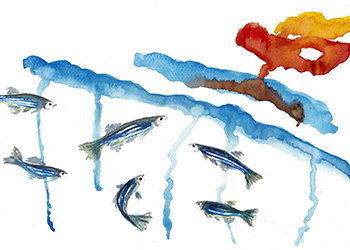Fish also need friends

The support that each individual receives from their surrounding peers influences their behaviours and may even help in overcoming unfavourable circumstances. In addition to being a human characteristic, other social animals manage to recover better from an adverse event in the presence of their peers. Such is the case with the zebra fish.
A new study led by Rui Oliveira, a researcher at the Gulbenkian Science Institute, ISPA – the University Institute and the Champalimaud Foundation, shows that the zebra fish needs social support to overcome adverse situations, which makes this fish a preferential model for studying this behaviour and its underlying neural mechanisms.
Experiments made by this research team show how zebra fish, whenever able to see and smell their school, display less fear towards a threatening situation than when they are alone. Among the visual and olfactory clues is the visualisation of the school that seems to be most effective in reducing the fear response when facing a prolonged exposure to threat and not depending on the size of the school.
The study furthermore shows how the social support phenomena of zebra fish triggers a specific pattern of activation in various cerebral areas (pre-optic area, amygdala) that are also involved in the same phenomena in mammals. These similarities between the cerebral area activated therefore indicate the zebra fish as an ideal model organism for research into social support and able to reproduce neural mechanisms that resemble those of human beings.
The discoveries made by this study, now published in the Scientific Reports journal, open the way to a better understanding of social behaviours so determinant to human wellbeing and of particular relevance to certain diseases such as depression or generalised anxiety.
